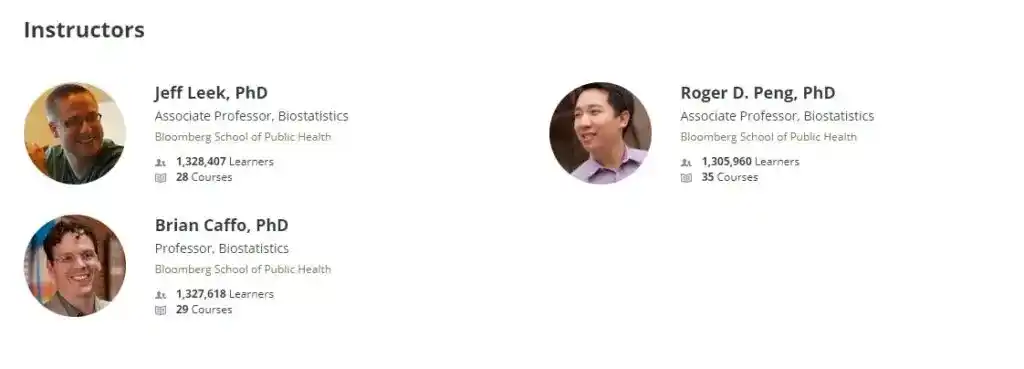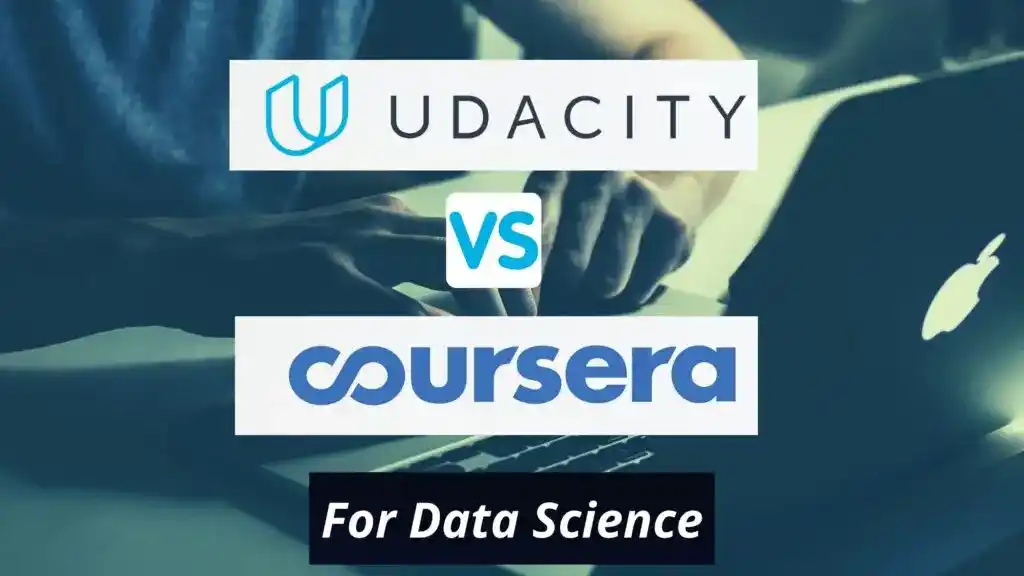As a data science learner, you might have heard about Udacity and Coursera. Both are popular MOOCs platforms and offer a variety of online Data Science courses. But both Udacity and Coursera have some distinct differences you should know before enrolling. So if you are not sure which one is better, then read this comparison Udacity vs Coursera for Data Science.
- What is Udacity?
- What is Coursera?
- 1. Udacity vs Coursera: Price
- 2. Udacity vs Coursera: Instructors
- 3. Udacity vs Coursera: Data Science Topics Covered
- 4. Udacity vs Coursera: Quality of the Courses
- 5. Udacity vs Coursera: Time Commitment
- 6. Udacity vs Coursera: Support
- 7. Udacity vs Coursera: Data Science Courses
- 8. Udacity vs Coursera: FREE Courses
- What are Udacity Pros and Cons?
- What are Coursera Pros and Cons?
- Who Should Enroll in Udacity?
- Who Should Enroll in Coursera?
- Summary
- Conclusion
Udacity vs Coursera for Data Science
What is Udacity?
Udacity is a for-profit educational platform located in Silicon Valley that provides MOOCs and micro-credential programs (Nanodegrees). MOOC means Massive Open Online Courses.
Udacity was launched in June 2011 by two Stanford university lecturers. They offered their first course free and this course was watched by more than 160,000 students from around 200 counties. And now Udacity has around 12 million users and 300 employees.
Udacity’s courses have partnerships with some reputed organizations for example Facebook, Google, Nvidia, and Amazon.
Udacity provides courses and Nanodegrees in various domains such as Data Science, Programming, Business, Artificial Intelligence, Autonomous Systems, Cloud computing, and Cybersecurity.
What is Coursera?
Coursera is an E-Learning platform that provides thousands of online courses on various subjects. It was founded by Stanford University computer science professors Daphne Koller and Andrew Ng in 2012.
And Coursera has a partnership with more than 200 universities and institutions across 29 countries. Some of them are Princeton University, Stanford University, Duke University, the University of London, the University of Pennsylvania, the University of Michigan, etc.
Coursera has open online courses, specialization programs, professional certificate programs, and online degrees.
Now let’s compare Udacity and Coursera with the following 8 parameters and see which will win the Competition-
1. Udacity vs Coursera: Price
Whenever we choose any course, price is always a factor. But we should focus on overall value. So let’s understand the pricing plan of Udacity and Coursera.
Udacity
Udacity provides two pricing structures-
- Monthly Payment- In this pricing structure, you have to pay the Udacity Fees monthly as you go with the course. This monthly payment cost around $399/month. But most of the time, you get discounts.
- Fixed Monthly Payment- In this payment method, you have to pay for a certain number of months. Let’s say for 4 months or for 5 months. You will get a fixed monthly payment subscription at a discounted rate (15% off) and will pay a one-off fee upfront. But in a fixed monthly payment mode, you need to plan your study in a manner that you can finish the whole Nanodegree program in that period. Otherwise, you have to pay further.
But Udacity also has approx 200 FREE courses, which you can watch at no cost.
Coursera
Coursera offers a 7 Day Free Trial which means you can learn free for 7 days. And if you find the course useful, then you can pay a monthly subscription amount which is between $39 to $80 (based on the specialization program). Coursera also provides a financial aid option, so you can apply for financial aid.
Coursera also provides university-recognized online degrees which cost around $15,000 and $25,000, depending upon the program.
–Winner in Terms of Price-
The winner is Coursera because it is much cheaper than Udacity. But Udacity also provides graded projects, mentor support, and career services.
Coursera wins, so the Score is Udacity: Coursera= 0:1
2. Udacity vs Coursera: Instructors
If you are planning to enroll in any data science course, I would recommend you to research who’ll be teaching you. The more details you collect, the better trust you can build with your instructor.
Udacity
Udacity Instructors are industry professionals with more than 5+ years of experience. Udacity prefers experienced professionals from big companies like Amazon, Facebook, YouTube, and Google to provide real-world industry experience. And Udacity requires the following criteria for their instructors-

This requirement shows that all the Udacity Instructors are highly professional and experienced. I personally learned from Olli Iivonen in the Udacity Data Engineering Nanodegree. He is a Data Engineer at Wolt with several years of experience in building and managing data pipelines on various data warehousing environments.
Coursera
In Coursera, all the instructors are from renowned top Universities. Coursera prefers the instructor’s academic credentials. That’s why most of the instructors are university professors. Coursera also provides a brief bio, but also credentials, including experience and degrees. For example, you can see the Instructors of the Data Science Specialization by Johns Hopkins University.

–Winner in Terms of Instructors-
Both are winners in terms of Instructors. Because both platforms have experienced and skilled professionals with impressive credentials.
Both are the winners, so the Score is Udacity: Coursera= 1:2
3. Udacity vs Coursera: Data Science Topics Covered
Udacity
In Udacity, the following data science topics are covered-
- Programming Skills
- Statistics
- Machine Learning
- Data wrangling.
- Data Visualization.
- Database Management
- Data Engineering
- Data Analytics
- Business Analytics
Coursera
Coursera covers the following data science topics-
- Programming Skills
- Statistics or Probability
- Machine Learning
- Multivariate Calculus and Linear Algebra
- Data wrangling.
- Data Visualization.
- Database Management
- BigData
- Data Engineering
- Data Analytics
- Business Analytics
–Winner in Terms of Topics Coverage–
Both platforms cover almost all data science topics, but Udacity doesn’t have any dedicated Math course for data science. That’s why Coursera is the winner.
Coursera wins, so the score is Udacity: Coursera= 1:3
4. Udacity vs Coursera: Quality of the Courses
Quality of the course is the important factor you shouldn’t avoid. So let’s see which platform has good quality of data science courses-
Udacity
The content quality of the Udacity Nanodegree program is far better than other MOOCs platforms. I am saying this based on my experience and other student’s reviews.
The reason for the high content quality is their practical-based learning. Because when we implement our learning, then it becomes stronger. And all the Nanodegree programs have graded projects and capstone projects for practical exposure.
Coursera
Coursera has well-structured courses from educational institutions around the world. But some of the Coursera courses need an update. Their content is not up to date. Some of the Coursera graded assignments also need an update. I am saying this based on student’s reviews.
–Winner in Terms of Course Quality–
Udacity is the clear winner in terms of course quality. Because their content is up to date and has graded projects and capstone projects for practical exposure.
Udacity wins, so the score is Udacity: Coursera= 2:3
5. Udacity vs Coursera: Time Commitment
Udacity
Most of the Udacity Nanodegree programs require 3-6 months to complete because of in-depth study material. In Udacity after each lesson, there is a Quiz which you need to complete. This quiz ensures that you understood the concepts taught in the course.
Along with quizzes, there are graded projects. These are real-world projects which are reviewed by expert mentors. So all these steps take 3-6 months of dedicated learning.
Coursera
Coursera also requires a significant amount of time to finish. But Coursera courses don’t take as long as Udacity. You can finish the Coursera courses within a few weeks or months. Some of the Specializations typically take months.
But it depends upon how much time you are giving daily. For example, IBM Data Science Professional Certificate takes 10 months to complete if you spend 5hour/week. But if you spend more hours then you can complete the full IBM Data Science Professional Certificate in a month.
-Winner in Terms of Time Commitment-
No one is the winner because time commitment depends upon your preference. If you want more in-depth courses, then Udacity is good for you.
No one wins, so the score is Udacity: Coursera= 2:3
6. Udacity vs Coursera: Support
One of the biggest problems with online learning is the lack of an involved professor that can help you when you have any query. Udacity and Coursera both tackle this problem differently.
Udacity
In Udacity, when you enroll in Udacity Nanodegree program, a one-to-one mentorship is provided by Udacity. This mentor will guide you throughout the program. You can ask your queries with the mentor. Mentor Support is very helpful when you work on projects. Because while working on a project, you may have various queries, which you can ask with your mentor. This Udacity’s Mentor support feature is amazing.
Coursera
Coursera doesn’t provide one-to-one mentorship but you can ask your queries with other learners, peer assessments, and teacher forums.
-Winner in Terms of Support-
Udacity is the winner. Because Udacity provides a one-to-one mentorship which is more helpful when you work on projects.
Udacity wins, so the score is Udacity: Coursera= 3:3…It’s a Tie!
7. Udacity vs Coursera: Data Science Courses
Both platforms have various online courses on Data Science Topics. So let’s see in detail-
Udacity
Udacity has the following Top Nanodegree Programs-
Artificial Intelligence-
- AI for Business Leaders
AI for Healthcare
AI Product Manager
AI Programming with Python
Artificial Intelligence
Artificial Intelligence for Trading
Computer Vision
Deep Learning
Deep Reinforcement Learning
Machine Learning
Intro to Machine Learning with TensorFlow
Intro to Machine Learning with PyTorch
Data Science
- Business Analytics
Data Analyst
Data Engineer
Data Scientist
Data Architect
Data Visualization
Predictive Analytics for Business
R for Data Science
Python for Data Science
Cloud Computing
- AWS Cloud Developer
AWS Cloud Architect
AWS Cloud DevOps Engineer
Cloud DevOps using Microsoft Azure
Become a Cloud Developer using Microsoft Azure
Programming and Development
- C++ Developer
Android Basics by Google
Kotlin Developer
Agile Software Development
Data Engineer
Front End Web Developer
Full Stack JavaScript Developer
Intermediate JavaScript
Java Developer
React
Python for Data Science
Autonomous Systems
- C++
Flying Car and Autonomous Flight Engineer
Intro to Self-Driving Car
Robotics Software Engineer
Self-Driving Car Engineer
Sensor Fusion Engineer
Computer Vision
Business
- Business Analytics
Digital Marketing
Marketing Analytics
Predictive Analytics for Business
UX Designer
Product Management
Career
Udacity also has Free Courses for data science which I will discuss in the upcoming section.
Coursera
- IBM Data Science Professional Certificate
- Data Science Specialization
- Applied Data Science with Python Specialization
- Business Analytics Specialization
- Data Engineering, Big Data, and Machine Learning on GCP Specialization
- IBM Data Analyst Professional Certificate
- Excel to MySQL: Analytic Techniques for Business Specialization
- Statistics with R Specialization
- Data Engineering with Google Cloud Professional Certificate
- Become a Data Engineer
- Big Data Specialization
- Data Warehousing for Business Intelligence Specialization
- Modern Big Data Analysis with SQL Specialization
- From Data to Insights with Google Cloud Platform Specialization
- Machine Learning
- Deep Learning Specialization
- Machine Learning with Python
- Advanced Machine Learning Specialization
- Mathematics for Machine Learning Specialization
Winner
Both are the winners because both platforms have enough material to learn data science.
Both wins, so the score is Udacity: Coursera= 4:4
8. Udacity vs Coursera: FREE Courses
Both platforms have a good amount of Free courses available. So let’s see the Free courses and their quality.
Udacity
Udacity has around 200 Free courses with good quality content. Which is very rare in other MOOCs platforms. These Udacity free courses are a good place to start and get a basic understanding of the topic.
The content quality of Udacity free courses is good, but they don’t provide other services with free courses like Projects, Certificate of Completion, Mentor Support, and Career Services.
But Udacity free courses are very in-depth and cover much of the same industry-relevant material covered in their Nanodegree programs.
Coursera
In Coursera, most individual courses are free to audit. But in Free to audit mode, you will not receive a certificate, and all course materials and assignments will not be provided.
To get a certificate and full access to the course material, you have to pay the amount. And the amount may vary between $29 to $99.
Winner
Udacity is the winner because their free courses also provide more value and cover in-depth concepts of the subject.
Udacity wins, so the score is Udacity: Coursera= 5:4
Overall, Udacity wins the competition of Udacity vs Coursera for data science with 1 point.
Now let’s see the Pros and Cons of Udacity and Coursera-
What are Udacity Pros and Cons?
Udacity has many competitors but still, Udacity is in demand due to its pros. So let’ see what are the Udacity Pros-
🟢 High-Quality Content
Udacity provides top-quality content even in the Free courses. This feature makes Udacity Unique from other MOOCs platforms. The reason behind top-quality content is Udacity’s courses have partnerships with some reputed organizations for example Facebook, Google, Nvidia, and Amazon.
🟢 Lots of FREE Courses
Udacity has around 200 Free courses with good quality content. Which is very rare in other MOOCs platforms. These Udacity free courses are a good place to start and get a basic understanding of the topic.
🟢 Best Mentor Support
When you enroll in Udacity Nanodegree program, a one-to-one mentorship is provided by Udacity. This mentor will guide you throughout the program. You can ask your queries with the mentor. Mentor Support is very helpful when you work on projects. Because while working on a project, you may have various queries, which you can ask with your mentor. This Udacity’s Mentor support feature is amazing.
🟢 Top Quality Real-World Projects
As I mentioned earlier that Udacity focuses on project-based learning. And Udacity has High-quality graded student projects. These projects will provide practical experience in the particular field. For example, if you are in the programming field, then the project is related to creating a real-world application. And these projects are guided by an assigned mentor.
🟢 Best Career Service
Udacity not only provides content but also provides career service. And this career service is included in all Nanodegree programs. Udacity will help you to prepare your resume, help to optimize your LinkedIn profile and provide interview preparation tips. This feature makes Udacity unique from others.
So these are Udacity Pros, now let’s see what are the Udacity Cons-
🔴 Expensive
Udacity Nanodegree programs are a bit expensive as compared to other MOOCs platforms. So your pocket has to bear an extra burden.
🔴 Udacity doesn’t have any App
Udacity had an IOS and android app, but they removed the App in 2019. So now Udacity doesn’t have any IOS and android app. Most of the time we study on our smartphones and outside the house. And in this case, it is difficult to study Udacity’s website on mobile. But according to the sources, the Udacity team is working on the IOS and android app development.
What are Coursera Pros and Cons?
🟢 Less Expensive
Coursera is much cheaper than the Udacity Nanodegree program. So if you don’t want to spend such a huge amount on your learning, then Coursera is the best platform for you. In Coursera, you can also get a 7-day free access trial.
🟢 Language Selection
Most people prefer courses in their native language. And Coursera has courses in various languages either directly, or through the use of transcriptions.
🟢 Easy Navigation
Coursera is easy to use platform. You can easily access videos, discussion forums, reading materials, and tests.
🟢 Active Community
Coursera has an active community where you can ask your queries. No matter how good the teaching material is, you might always need extra help. This community can answer your question. And also this becomes extremely relevant if you are taking programming courses.
So these are Coursera Pros, now let’s see what are the Coursera Cons-
🔴 Not Clear Price
As a first-time visitor without any Coursera account, you can’t see the actual price of the course. To check the price, you need to make an account and then you can check the price. Which is annoying.
🔴 Some Course Videos are not Clear
Some Instructors are not good in front of the camera, they should train their people a little bit more for those things.
So these are the Pros and Cons of Udacity and Coursera. I hope now you have a better understanding of both platforms. Now let’s see who should enroll in which platform-
Who Should Enroll in Udacity?
- Those who are not Beginners in Data Science and have basic knowledge in Programming and high school level math.
- And those who are looking for more advanced level data science courses with real-world projects along with mentor support and career services.
Who Should Enroll in Coursera?
- Those who are beginners in data science and want to learn Data Science from a formal university and by experienced instructors from the world’s top universities.
Now let’s see the summary of this whole comparison of Udacity vs Coursera for data science in this table-
Summary
| Udacity | Coursera | |
| Price | Udacity has Nanodegrees and Free Courses. For Nanodegrees there are two pricing structures, Monthly Payment & Fixed Monthly Payment. This monthly payment cost around $399/month. | Coursera offers a 7 Day Free Trial and then you have to pay a subscription amount per month that cost around $39 to $80 (based on the specialization program) |
| Mode of Learning | Most of the Udacity courses are self-paced. That means you can complete the course at your own pace. | Coursera also provides self-paced videos with schedule learning. |
| Learning Material | Udacity has Nanodegree programs and Free Online Courses. | Coursera provides courses, specialization programs, and online degrees. |
| Pros | 1. Udacity provides top-quality content even in the Free courses. This feature makes Udacity Unique from other MOOCs platforms. 2. When you enroll in Udacity Nanodegree program, a one-to-one mentorship is provided by Udacity. This mentor will guide you throughout the program. 3. Udacity has High-quality graded student projects. These projects will provide practical experience in the particular field. 4. Udacity not only provides content but also provides career service. And this career service is included in all Nanodegree programs. | 1. Well structured courses 2. All Courses are from educational institutions around the world. 3. Widest catalog of courses with a certification by a professional institution like Universities. |
| Cons | 1. Udacity Nanodegree programs are a bit expensive as compared to other MOOCs platforms. 2. Udacity doesn’t have any Mobile Applications. So sometimes it’s difficult to study on Udacity’s website on mobile. | 1. Needs more commitment to the courses. 2. Some of the course content needs an Update. |
| Best for- | Those who are looking for more real-world project-based advanced data science training. | Those who are a beginner in Data Science and looking for structured and credible courses from Top Universities. |
| Visit Udacity | Visit Coursera |
Conclusion
I hope now you have a clear understanding of both platforms Udacity and Coursera. I hope this comparison of Udacity vs Coursera for Data Science will help you to decide which platform is better for you to learn Data Science depending upon your needs.
If you have any questions, feel free to ask me in the comment section. I am here to help you. And If you found this article helpful, share it with others to help them too.
All the Best for your Data Science Journey!
Happy Learning!
You May Also Interested In
Udacity Data Engineering Nanodegree Review in 2025- Should You Enroll?
Is Udacity Data Science Nanodegree Worth It in 2025?
Is DataCamp Good for Learning Data Science or not in 2025?
15 Best Online Courses for Data Science for Everyone in 2025
Data Analyst Online Certification to Become a Successful Data Analyst
8 Best Data Engineering Courses Online- Complete List of Resources
Best Course on Statistics for Data Science to Master in Statistics
8 Best Tableau Courses Online- Find the Best One For You!
8 Best Online Courses on Big Data Analytics You Need to Know
Best SQL Online Course Certificate Programs for Data Science
7 Best SAS Certification Online Courses You Need to Know
Thank YOU!
Explore More about Data Science, Visit Here
Though of the Day…
‘ It’s what you learn after you know it all that counts.’
– John Wooden
Written By Aqsa Zafar
Founder of MLTUT, Machine Learning Ph.D. scholar at Dayananda Sagar University. Research on social media depression detection. Create tutorials on ML and data science for diverse applications. Passionate about sharing knowledge through website and social media.


